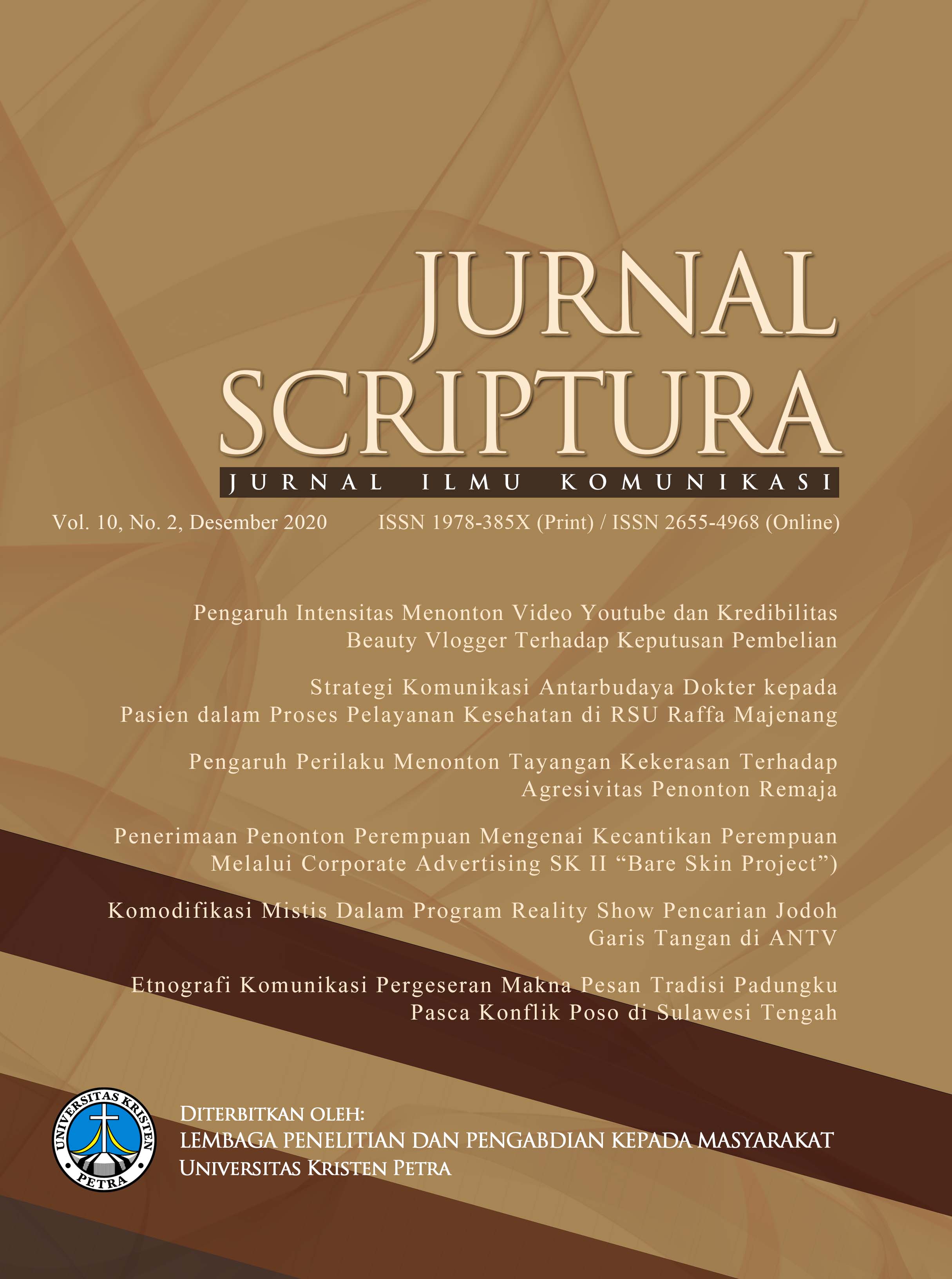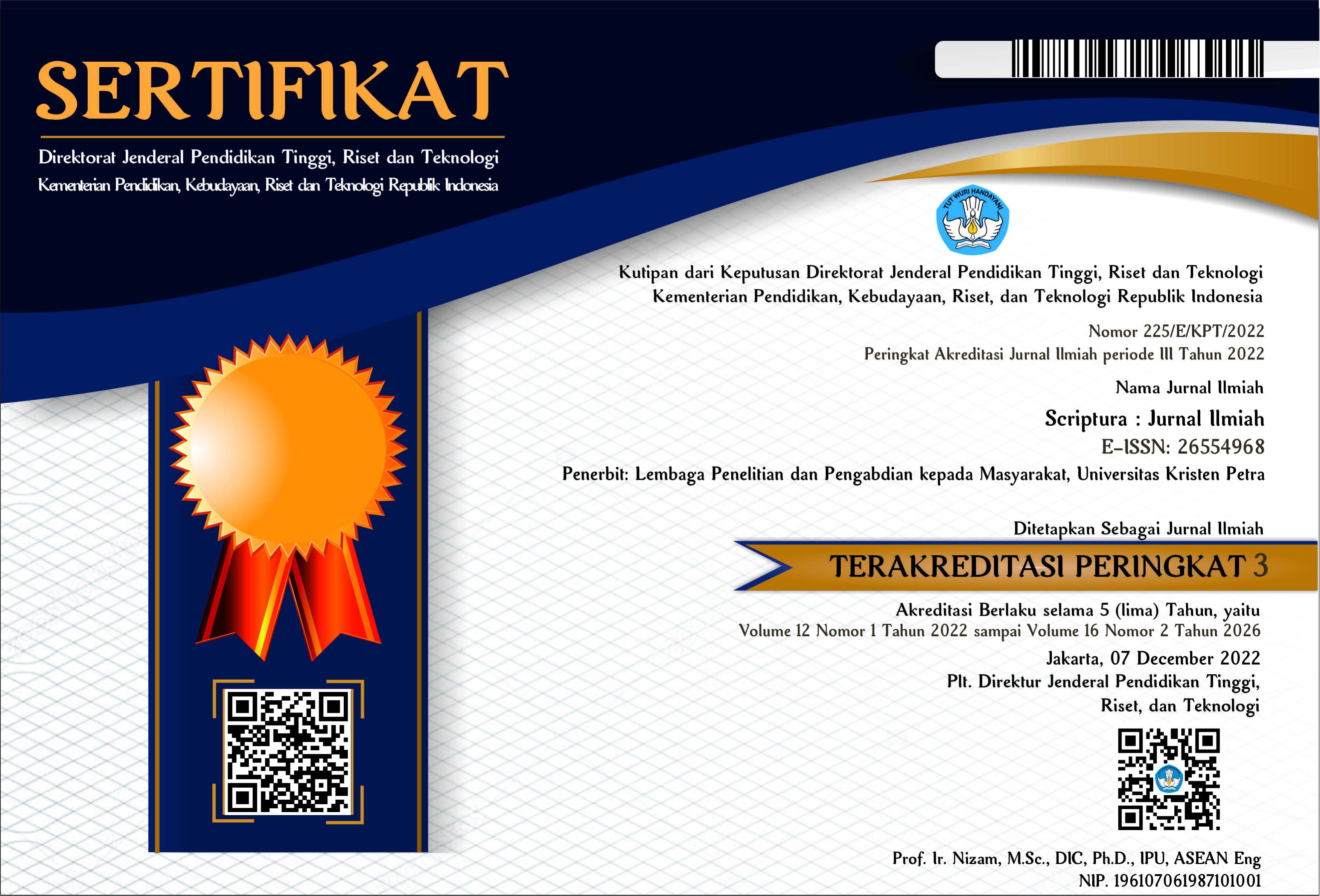KONSEP DIRI: ANALISIS KESADARAN LINGKUNGAN KAUM VEGAN DAN VEGETARIAN DI BRITANIA RAYA
 :
:
https://doi.org/10.9744/scriptura.11.1.10-17
Keywords:
Konsep diri, komunikasi interpersonal, vegetarian, vegan, kesadaran lingkunganAbstract
Konsep diri merupakan kesadaran tiap individu yang kompleks dan melibatkan proses pemikiran mendalam. Dalam proses pembentukan konsep diri, seorang individu dipengaruhi oleh berbagai faktor internal maupun eksternal. Konsep diri kita dalam menjaga atau merusak lingkungan ternyata dibentuk melalui kebudayaan dan proses sosial. Penelitian ini mengkaji bagaimana konsep diri yang terkait dengan kesadaran lingkungan pada kaum vegetarian dan vegan di Britania Raya. Metode yang dipakai adalah fenomenologi dengan pendekatan kualitatif deskriptif dan teknik pengumpulan data wawancara. Relevansi penelitian ini adalah untuk melihat bagaimana faktor internal dan eksternal memengaruhi konsep diri seorang individu. Hasil penelitian menunjukkan bahwa alasan utama seseorang menjadi vegetarian atau vegan adalah karena ajaran agama atau budaya. Temuan lain dari penelitian ini adalah bahwa terpaan pesan media tidak berdampak besar pada perubahan konsep diri seorang individu. Komunikasi interpersonal dengan orang lain seperti teman justru lebih efektif dalam membentuk konsep diri seseorang.
References
Alsmadi, A. (2007). Green Marketing and the Concern over the Environment: Measuring En¬vi¬ronmental Consciousness of Jordanian Consumers. Journal of Promotion Management, 13(3-4), pp. 339-361.
Dante’s. (2020). Home Page. Retrieved from https:// www.dantes.co.uk/
Hattie, J. (2014). Self-Concept. New York: Psychology Press.
Hirschler, C., (2008). An Examination of Vegan’s Belief and Experiences Using Critical Theory and Autoethnography. Doctor of Philosophy. Cleveland State University.
Huang, H., Lin, T., Lai, M., and Lin T. (2014). Envi-tonmental Consciousness and Green Customer Behaviour: An Examination of Motivation Crowding Effect. Elsevier, 40, pp. 139-149.
Fox, M. A. (1999). Deep Vegetarianism. Philadelphia: Temple University Press.
Groenewald, T. (2004). A Phenomenological Research Design Illustrated. International Journal of Qualitative Methods.
Littlejohn, S. W. & Foss, K. A. (2011). Theories of Human Communication: Tenth Edition. USA: Waveland Press.
Manav Sva. (2020). Home Page. Retrieved from http://manavseva.co.uk/
MyChef. (020). History. Retrieved from https://www. mychef.com/history
Nugrahani F. (2014). Metode Penelitian Kualitatif. Surakarta: akra Books
Senecah, Susan L. (2004). The Environmental Communication Yearbook. New Jersey: Lawrence Erlbaum Associates.
Stanfield, P. S. & Hui, Y. H. (2010). Nutrition and Diet Therapy: Self-Instructional Approaches. USA: Jones and Bartlett Publishers.
Spencer, C. (1995). The Heretic’s Feast: A History of Vegetarianism. Hanover: University Press of New England.
Vegan Society (2019). The Vegan Society Survey. Retrieved from: https://www.vegansociety.com/ news/media/statistics
West, R. & Turner, L. H. (2014). Introducing Communication Theory: Analysis and Application. New York: McGraw Hill Education.
Yale Center for Environmental Law & Policy. (2020). Environmental Performance Index. https://epi.yale.edu/epi-results/2020/component/ epi.
Downloads
Published
How to Cite
Issue
Section
License
Copyright (c) 2021 Lila Nathania

This work is licensed under a Creative Commons Attribution 4.0 International License.
Authors who publish in the SCRIPTURA Jurnal Ilmiah agree to the following terms:
Authors retain unrestricted copyright and full publishing rights. The authors grant the Publisher the right of first publication, with the work simultaneously licensed under the terms and conditions of the Creative Commons Attribution License (CC BY) that allows for unlimited use, distribution, and content reproduction on all media as long as the original author and source are properly acknowledged and cited.


















